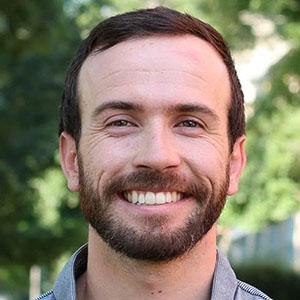Greg Rulifson
Teaching Assistant Professor, Division of Engineering Design & Society
 In the classroom, Greg teaches Humanitarian Engineering courses such as Engineering for Sustainable Community Development (EDNS/LAIS 377), Projects for People (EGGN 401), and Engineering for Social and Environmental Responsibility (EDNS 315). He also has responsibilities as the ‘Humanitarian Engineering Advisor’ to the Capstone (formerly known as Senior Design) teams in the CECS college that are working on real, impactful projects with partners around the world. Throughout his short time at Mines, he has taught at all undergraduate levels and always was impressed with the dedication and motivation of Mines students. Greg also guides and advises the excellent Shultz Scholars in their efforts to increase engagement with the Humanitarian Engineering program to create a strong and sustainable community of HE students. Greg co-advises Mines Without Borders, a student group that practices humanitarian engineering, currently partnering with communities in western Nicaragua. He enjoys a respite and connection to his love of team sports from time to time through the Faculty Oversight Committee on Student Athletics. External to Mines, Greg is a liaison to a number of international development organizations through the Posner Center for International Development in Denver. He also is currently an evaluator on Professor Jessica Smith’s CSR in Engineering Education research project, and a senior advisor to the NSF research project led by Shawhin Roudbari of CU Boulder, “Institutional cultures of ethical community engagement in engineering-for-development programs.” Greg earned his PhD in Civil Engineering at CU Boulder by conducting a longitudinal, intensive study of how students’ definitions of and relationship between social responsibility and engineering changed throughout college, tracking the many influences on their attitudes and interests (see Dissertation, two journal papers in publication), and how prosocial career desires could motivate students out of engineering majors (published in Engineering Studies). He also completed a certificate in Engineering for Developing Communities through course work and a practicum involving housing reconstruction in central Aceh, Sumatra, Indonesia with the organization, Build Change. Before moving to Colorado, Greg grew up in the foothills northeast of Sacramento, California in the middle of two dancing and outgoing sisters (that ended up with Architecture and Neurobiology degrees), guided and loved by his single mother who objectively is the greatest mother in the world. This background and some chance encounters led to a passion for engineering towards international development. To date, Greg has experience with projects in seven countries on five continents, including living and working in Nicaragua and Indonesia thrice, where he engineered structures through collaboration with community members to mitigate their risks due to earthquakes and tsunamis. He is a licensed Professional Civil Engineer in the State of California, earned an M.S. from Stanford University in Structural Engineering and Risk Analysis, and a B.S. from UC Berkeley in Civil and Environmental Engineering with a minor in Global Poverty and Practice.
In the classroom, Greg teaches Humanitarian Engineering courses such as Engineering for Sustainable Community Development (EDNS/LAIS 377), Projects for People (EGGN 401), and Engineering for Social and Environmental Responsibility (EDNS 315). He also has responsibilities as the ‘Humanitarian Engineering Advisor’ to the Capstone (formerly known as Senior Design) teams in the CECS college that are working on real, impactful projects with partners around the world. Throughout his short time at Mines, he has taught at all undergraduate levels and always was impressed with the dedication and motivation of Mines students. Greg also guides and advises the excellent Shultz Scholars in their efforts to increase engagement with the Humanitarian Engineering program to create a strong and sustainable community of HE students. Greg co-advises Mines Without Borders, a student group that practices humanitarian engineering, currently partnering with communities in western Nicaragua. He enjoys a respite and connection to his love of team sports from time to time through the Faculty Oversight Committee on Student Athletics. External to Mines, Greg is a liaison to a number of international development organizations through the Posner Center for International Development in Denver. He also is currently an evaluator on Professor Jessica Smith’s CSR in Engineering Education research project, and a senior advisor to the NSF research project led by Shawhin Roudbari of CU Boulder, “Institutional cultures of ethical community engagement in engineering-for-development programs.” Greg earned his PhD in Civil Engineering at CU Boulder by conducting a longitudinal, intensive study of how students’ definitions of and relationship between social responsibility and engineering changed throughout college, tracking the many influences on their attitudes and interests (see Dissertation, two journal papers in publication), and how prosocial career desires could motivate students out of engineering majors (published in Engineering Studies). He also completed a certificate in Engineering for Developing Communities through course work and a practicum involving housing reconstruction in central Aceh, Sumatra, Indonesia with the organization, Build Change. Before moving to Colorado, Greg grew up in the foothills northeast of Sacramento, California in the middle of two dancing and outgoing sisters (that ended up with Architecture and Neurobiology degrees), guided and loved by his single mother who objectively is the greatest mother in the world. This background and some chance encounters led to a passion for engineering towards international development. To date, Greg has experience with projects in seven countries on five continents, including living and working in Nicaragua and Indonesia thrice, where he engineered structures through collaboration with community members to mitigate their risks due to earthquakes and tsunamis. He is a licensed Professional Civil Engineer in the State of California, earned an M.S. from Stanford University in Structural Engineering and Risk Analysis, and a B.S. from UC Berkeley in Civil and Environmental Engineering with a minor in Global Poverty and Practice.